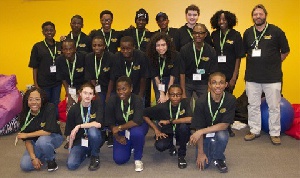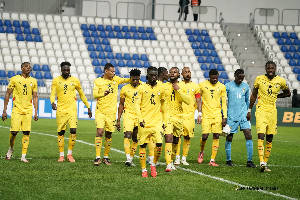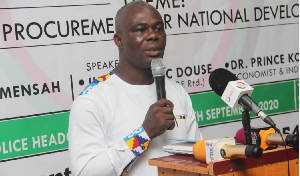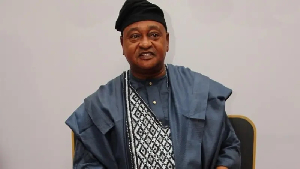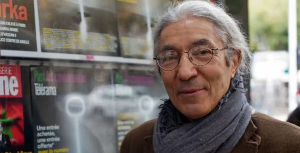Over 50 high school students from the United States and Ghana faced off in Washington, DC on March 18 to create innovative science, technology, engineering, and math (STEM) solutions to critical global challenges.
Team “Big Bang Brains of the World,” comprised of students and teachers from Eleanor Roosevelt High School in Greenbelt, Maryland, and Edinaman Senior High School in Elmina, Ghana, won the competition with their concept for the Earth Battery. The device works by converting the chemical energy in wet soil to electrical energy. The voltage produced can light LED bulbs.
Prototype concepts by the three other finalists included a natural water purifier, a sustainable exhaust filter, and a kinetic piezo-electric mat. “Now that we can generate electricity from soil, it can help solve Ghana’s power crisis,” said Queen Jasmine Grant from Edinaman Senior High School in Ghana, a participant on the winning team.
“The potential impact of the Earth Battery can help enhance children’s education by powering electricity in schools and household appliances.” The competition was the culminating event of the World Smarts STEM Challenge – a virtual exchange initiative run by the global development nonprofit IREX and supported by Carnegie Corporation of New York.
It pairs 10th and 11th grade students and teachers in Ghana, Washington, DC, and Prince George’s County, Maryland, on diverse, collaborative teams. To develop and promote their concept, team ‘Big Bang Brains of the World’ will now receive support to market their innovation to angel investors, crowdfunding initiatives, and corporate partners.
The World Smarts STEM Challenge will also match up to $10,000 in funds raised to further invest in their prototype. “With $10,000 we could make roughly 1,400 Earth Batteries,” said Michael Nagel of Eleanor Roosevelt High School in Maryland. “Someday, the battery could even be used for emergency relief for natural disasters, powering refugee camps, or benefiting local businesses.”
Over the course of four months, more than 240 students and 16 bi-national teams embarked on a collaborative virtual exchange to discover and build STEM solutions to global issues that affect their communities, inspired by the UN Sustainable Development Goals. IREX selected four teams as finalists to present prototypes of their innovations at the showcase event to a panel of expert judges in STEM fields.
The judges included: Astrid Aniwa, Forensic DNA Technologist, Bode Cellmark Forensics; James Creel, Senior Program Manager, Engineering for Global Development, American Society of Mechanical Engineers; Jim Egenrieder, Director, Virginia Tech Thinkabit Labs; Lauren Griggs, doctoral student, Department of Biomedical Engineering, Virginia Commonwealth University; Gabino Gurengomba, Co-Founder and CEO, Integrated Solar Technologies.
Not only does the initiative strengthen students’ skills in global collaboration and understanding, it aims to ignite students’ passion for STEM subjects and increase the number of students who major in higher education STEM fields throughout the US and Ghana. Only 16% of American high school seniors are proficient in math and interested in a STEM career.
Among those who do major in STEM during college, only about half choose to work in a related career. “STEM knowledge is an essential component to solving the global challenges we face today,” said Rebecca Bell Meszaros, associate vice president for education at IREX. “We want to empower young people to pursue success on an international scale. World Smarts is a way to strengthen their skills and encourage them to get excited about the possibilities for innovation and problem-solving with STEM.”
General News of Thursday, 23 March 2017
Source: 3news.com

